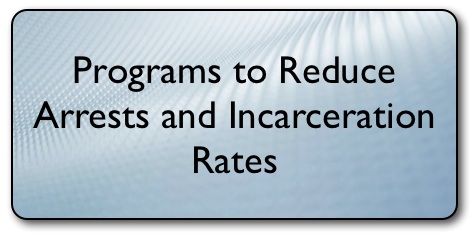
Top Incarceration Reduction Proposals and Initiatives. These are the top suggestions so far. Articles are ranked in order of how many people submitted the idea, how popular it is, and the estimated impact based on the cost and outcome ratio.
- Bail Reform. Institute bail reform initiatives so the poor have an equal chance at paying bail. [Full article here.]
- Electronic Monitoring. At a fraction of the cost of jail time, inmates are enabled to return to an environment where they can work, be with family, and have positive surroundings that can help reduce recidivism. [Source: Bob Thompson]
- Incarceration Term Limits. Reduce the length of stay in jail, particularly for non-violent offenders. [JCO-Justice.com]
- Students. Support programs to reduce arrests and incarceration of students [Full Article]
- Public Intoxication. Establish initiatives to eliminate Public Intoxication charges and arrests. [Full Article]
- Marijuana. Legalize Marijuana or allow officer discretion to locally make Marijuana laws irrelevant. [Read More]
- Diversion Programs for Drug and Alcohol Cases. In Johnson County, Iowa the County Attorney’s Office implemented a marijuana diversion program in July 2010 and an alcohol diversion program in January 2011. These initiatives replace jail time with treatment and education programs. [Read More]
- Driving Under Suspicion Court. The “Rocket Docket” court allows defendants facing simple misdemeanor Driving Under Suspension (DUS) charges to pay past due fines and other financial obligations in order to get a valid driver’s license in exchange for having their DUS charge dismissed. [Read More]
- Drug Court. A Drug Court provides extensive drug treatment, supervision, and weekly contact with the judge and Drug Court team. This reduces recidivism and saves millions of dollars. [Read More]
- Substance Abuse Evaluations and Treatment. It’s been determined that many people are incarcerated for what seem to be uniquely drug-related crimes. By removing the drug influence from people’s lives, with treatment, they can return to a normal productive life. [Read More]
- Court System. Unclog the overburdened court system through additional funding and expanded space.
- Inmate Care. Keep inmates close to family and stop shipping them elsewhere.
- Two Incarceration Levels. Some inmates are in jail as a result of a crime, and jail time is part of their punishment. However, some people are in jail without a trial and without the financial means to pay bail. These people should not endure the same incarceration experience as those being punished. Maintaining a minimalist utilitarian and sparse jail, as well as one with larger cells and more amenities would be appropriate.
- Better Conditions for Inmates and Workers. Why are jails and prisons such unpleasant places to be in and work in? What could be done to make conditions better for all involved.
Submissions. Suggestions for reducing incarceration are posted below as we receive them.
- “Bail should be based on a person’s financial means.” Sherman J. [Full article here.]
- “Make bail affordable & reasonable in Johnson county (ask any bondsman in Iowa, Johnson county as notoriously unattainable bonds) End the practice of sending ppl to jail for excessive time periods for technical probation & parole violations. People go to jail for talking to ‘people of unsavory character’, for being in bars–even if they are sober, for missing a meeting or forgetting to call in to the probation office, for sending letters to incarcerated friends…” ~ Veronica H.
- “We can learn from other countries where people are punished for crimes and still get to live at home, be part of the community, and actually earn money to pay back victims. Incarcerating people after arrests makes problems worse.” ~ Steve H.
- “One cost effective approach is to reduce the length of stay in jail.” ~ John Neff
- “We need to focus more on rehabilitation rather than incarceration, for example, minor drug offenders ought not be incarcerated, drug crimes should be seen as a health problem and not a legal problem, this is all costing the tax payers entirely too much money and the madness has to stop!” ~ Shayna K.
